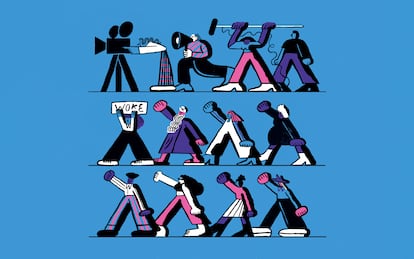The danger that Hollywood runs by forgetting the working class
While studios like Marvel or Disney have embraced ethnic and sexual diversity in their new productions, major studios have almost completely excluded the lower classes from their plots and creative processes

The Spanish writer and journalist Pedro Vallín said it in a 2019 essay: contrary to what it may seem (and to the dominant sentiment among the most erudite of European cinephiles), it is Hollywood’s commercial movies, not Italian, French, German or Spanish auteur films, that promote a progressive social agenda, show empathy for the weakest members of society and a commitment to social change. The disciples of Jean-Luc Godard seem to be much more interested in the narcissistic and solipsistic fantasies of a certain clique of upper-class male bohemians. Thus, it is to Hollywood, that great factory of spectacle and entertainment, that we must turn in search of pinnacles of social, disruptive and progressive cinema such as The Grapes of Wrath, Schindler’s List, V for Vendetta, Elysium, Joker, Midnight Cowboy or The Truman Show.
Judging by a series of recent articles, there are legions of American intellectuals who share this point of view. What’s more, the conservative faction considers that things have gone too far, that “left-wing” Hollywood has embarked on a dangerous drift by increasingly and resolutely embracing the woke agenda, that is, the commitment to ethnic, sexual and gender diversity. The latest object of controversy in this regard has been the animation film Spider-Man: Across the Spider-Verse, a blockbuster that has taken the world by storm, grossing over $500 million worldwide. The most successful of recent Marvel productions features an Afro-Latin Spider-Man, a Gwen Stacy committed to the transgender community, an alternative Hindu Spider-Man who lives in a hybrid between Bombay and Manhattan and a biker Spider-Woman who is pregnant and empowered.
As Aleks Phillips explains in Newsweek, this hymn to diversity refutes the famous adage “Go Woke, Go Broke.” The promoters of this theory are predicting a commercial apocalypse for Disney if it does not renounce its commitment to an inclusive and diverse agenda as soon as possible. Phillips writes that “a very active and belligerent core of millennials on social media are promoting the boycott of fiction that they perceive as too political and, consequently, far from the logic of pure entertainment.” But their “digital torpedoes” are apparently not useful “to sink ocean liners like the new Spider-Man.” And a recent survey by Redfield & Wilton shows that 63% of Americans reject movies with a “woke political agenda,” a percentage that is close to 70% among those under 35, the natural audience for Disney and Marvel.
The issue is complex and contains many nuances. Although the latest Spider-Man has not taken a hit from its progressive fiction label, some others, such Strange World, have suffered the impact of online campaigns, with returns below initial expectations . Others, like Super Mario Bros, have become a symbol of resistance to the imperative of political correctness, reinforcing its success in the United States.
However, the elephant in the room, according to analysts like Alyssa Miller (no relation to the model), is social class diversity. And not so much in fiction as in the whole of that industrial and human conglomerate that we describe as Hollywood. In a biting article in No Film School, Miller denounces that classism, nepotism and caste philosophy have turned the American film industry into the private preserve of a small elite that is increasingly disconnected from the reality of common people. In the era of nepobabies (people like Maya Hawke, Lily-Rose Depp and other children of an aristocracy of rich and famous artists who decide to follow in their parents’ footsteps and inherit, from the outset, their agenda of contacts) there is no longer any place for working-class upstarts. And an industry that tends to exclude the working class from its auditions, its technical teams and its executive positions, Miller argues, will sooner or later end up exclusively reflecting the point of view of the dominant socioeconomic caste, no matter how many women, homosexuals and members of ethnic minorities its films include. The problem, according to The Hollywood Reporter editor Stephen Galloway, is that the classist inertias of the big studios are so solid that this contradiction is not even perceived. If Hollywood positions itself against Donald Trump and presents a greater degree of sexual, ethnic and gender diversity, he writes, it will remain progressive by American standards, even if it openly embraces elite values.
An example is how the latest Oscar winner, Everything Everywhere All at Once, was received. For conservative analysts such as John DeVore or Brian Viner, it is an example of woke fiction because it stars an empowered woman, presents as positive characters a young homosexual and a man who falls outside the traditional masculine role, and it furthermore adopts the point of view of a minority, the Asian-American community. Precisely these characteristics, in the opinion of Lisa Laman, editor of Collider, contributed to its extraordinary popularity among progressive filmgoers. Miller insists, despite everything, on a substantial detail that most commentators (Americans, not Europeans) tend to omit: besides the fact that they are immigrants, the main characters are a working-class family, and their precarious accommodation in the socioeconomic pyramid explains a lot of what happens in the film. Where some see race, gender and sexual identities, others detect something that is absent in much of America’s intellectual tradition: class warfare.
Sign up for our weekly newsletter to get more English-language news coverage from EL PAÍS USA Edition
Tu suscripción se está usando en otro dispositivo
¿Quieres añadir otro usuario a tu suscripción?
Si continúas leyendo en este dispositivo, no se podrá leer en el otro.
FlechaTu suscripción se está usando en otro dispositivo y solo puedes acceder a EL PAÍS desde un dispositivo a la vez.
Si quieres compartir tu cuenta, cambia tu suscripción a la modalidad Premium, así podrás añadir otro usuario. Cada uno accederá con su propia cuenta de email, lo que os permitirá personalizar vuestra experiencia en EL PAÍS.
¿Tienes una suscripción de empresa? Accede aquí para contratar más cuentas.
En el caso de no saber quién está usando tu cuenta, te recomendamos cambiar tu contraseña aquí.
Si decides continuar compartiendo tu cuenta, este mensaje se mostrará en tu dispositivo y en el de la otra persona que está usando tu cuenta de forma indefinida, afectando a tu experiencia de lectura. Puedes consultar aquí los términos y condiciones de la suscripción digital.









































